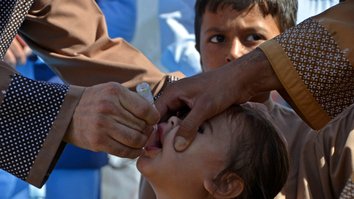GENEVA, Switzerland -- A raging measles outbreak in Afghanistan infected tens of thousands and killed more than 150 people in the past year, the World Health Organisation (WHO) said, warning of more deaths.
The United Nations (UN) health agency said the outbreak was particularly concerning since Afghanistan is facing widespread food insecurity and malnutrition, leaving children far more vulnerable to the highly contagious disease.
"Measles cases have been increasing in all provinces since the end of July 2021," WHO spokesman Christian Lindmeier told reporters in Geneva Friday (February 11).
Cases had surged recently, ballooning by 18% in the week of January 24 and by 40% in the last week of the month, he said.
In all, 35,319 suspected measles cases and 156 deaths were reported between January 1, 2021, and January 29, 2022, the WHO said.
A small fraction of the cases -- 3,221 -- were laboratory confirmed.
Most of the suspected measles cases -- 91% -- and 97% of the deaths occurred among children under the age of five.
The measles-related deaths are likely underreported and the numbers are expected to swell, said Lindmeier.
"The rapid rise in cases in January suggests that the number of deaths due to measles is likely to increase sharply in the coming weeks," he said.
Measles is a highly contagious disease caused by a virus that attacks mainly children. The most serious complications include blindness, brain swelling, diarrhoea and severe respiratory infections.
Measles is endemic, with almost all provinces reporting suspected cases every year.
The most affected provinces are Balkh, Ghazni, Helmand, Kandahar, Kabul, Paktika and Paktia, with the highest number of both confirmed and suspected cases, the WHO said.
Malnutrition and illness
The latest surge in cases comes as Afghanistan is in the grip of a humanitarian disaster, worsened by the fall of the Afghan government in August -- when Western countries froze international aid and access to assets held abroad.
Half the country is threatened with food shortages, the UN has warned.
Fourteen million people in Afghanistan are facing acute food insecurity, and an estimated 3.2 million children under five years suffer from acute malnutrition, according to the UN Children's Fund (UNICEF).
"Malnutrition weakens immunity, making people more vulnerable to illness and deaths diseases like measles, especially children," Lindmeier said.
The best protection against measles is broad vaccination, with the WHO recommending that countries ensure at least 95% vaccination coverage -- a difficult goal in the Afghan context.
Lower rates of immunisation in 2020 have worsened the impact of the outbreak.
The 2020 WHO/UNICEF national immunisation coverage estimates were 66% for the first dose of the measles vaccine and 43% for the second dose.
The internal displacement of 698,000 people in 2021 was another driver of low vaccination and higher rates of transmission.
Internally displaced persons are at higher risk of contracting measles because they have less access to immunisation services and often live in overcrowded housing with poor access to health services, the WHO said.
Recent instability in Afghanistan has raised the risk of international spread, particularly in Pakistan, Iran and Tajikistan, due to cross-border travel, it added.
The WHO and its partners have been working to scale up their measles surveillance capacities and provide support for lab testing and immunisation campaigns, said Lindmeier.
Last December, the WHO and its implementing partners carried out an immunisation campaign in response to a measles outbreak in Balkh, Ghazni, Ghor, Helmand, Kandahar and Paktika provinces.
The campaign took place in fixed locations, such as in mosques and schools and other places easily accessible for parents, and reached 1,510,440 children aged 9 months up to 5 years.
The WHO and its partners have also been providing vitamin A supplements, which are important to help reduce sickness and death from measles, reaching 8.5 million children in a nationwide campaign last November.
The WHO, Lindmeier said, is now working towards a larger measles vaccination drive starting in May, aimed at reaching more than three million children.

![Children receive medical treatment at the Mirwais hospital in Kandahar last September 27. [Bulent Kilic/AFP]](/cnmi_st/images/2022/02/14/34023-000_9nm4pd-585_329.jpg)







It is true that the health sector in Afghanistan, among other systems, has been harmed and affected by the situation, but not as much as the media is propagating about it. In particular, if we look at the predictions of the United Nations or other organizations, they almost publish lies. They always spread negative news about Afghanistan and do not publish anything to make the people hopeful. Afghans are in a difficult situation, but such information further depresses them, coerces them, and discourages them. There is no food, little attention is paid to education, health services are more minor, but we hate such reports. At least publish good news every week, and if that is the case, why do people, especially children, become malnourished when they are in Afghanistan? Why get infected with different diseases? In the short time that Afghanistan has been in the hands of the Taliban, what has happened to the hundreds of millions of dollars that have come to Afghanistan and been handed over to Da Afghanistan Bank? Employees and workers must be paid, agriculture must be worked on, and the economy must be strengthened so that people, especially children, can be freed from poverty and their health can be improved, even if the world sees that the government and officials are disobedient. If he does not provide services to the people, he should get involved and not trust the thieves.
Reply2 Comment
Why is it that children and people become malnourished? What was the purpose of the hundreds of millions of dollars sent to Afghanistan? Workers and employees must be paid. Agriculture must be developed and strengthened. The economy must also be strengthened to ensure that people, particularly children, are not in poverty and their health is improved.
Reply2 Comment